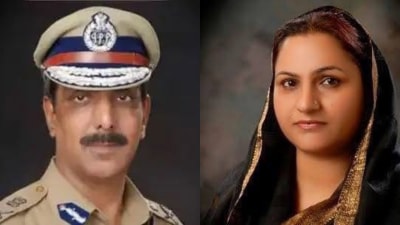Click here to follow Screen Digital on YouTube and stay updated with the latest from the world of cinema.
Kabir Khan at Expresso: ‘Saying you’re apolitical is the most political statement. It reeks of privilege’
At Expresso in Mumbai, director Kabir Khan and actor-producer Richa Chadha reflected on spending a decade in Bollywood, their big breaks, and being vocal about their political views.
 Kabir Khan, Richa Chadha and Vandita Mishra at Expresso in Mumbai. (Photo by Sankhadeep Banerjee)
Kabir Khan, Richa Chadha and Vandita Mishra at Expresso in Mumbai. (Photo by Sankhadeep Banerjee) In the latest edition of Expresso on Culture, director Kabir Khan and actor-producer Richa Chadha reflected on spending a decade in Bollywood, their big breaks, and being vocal about their political views. They were in conversation with Vandita Mishra, National Opinion Editor at The Indian Express.
Vandita Mishra: In 2025, both of you marked a milestone in your career. Bajrangi Bhaijaan came 10 years ago, and so did Masaan. Masaan painted the small town, its oppressions and its characters’ rebellions so vividly, and Bajrangi retold the India-Pakistan story with compassion and kindness. When you look back, how did these seminal films shape the last 10 years and the next 10 to come?
Richa Chadha: Niraj Ghaywan, the director and writer of Masaan, was the script supervisor on Gangs of Wasseypur and Varun Grover was the lyricist for Oye Lucky! Lucky Oye! I knew them from there. They came to me saying they had written something set in Banaras about a girl with a healthy sexual curiosity. Then it fell into place. Being an Indo-French co-production, I knew it had the possibility of travelling to film festivals but no one knew it would get such everlasting love.
Did it become a reference point for you for your later choices?
Richa Chadha: Not really. I wish I got scripts as complex and layered as Masaan later as well. That is any actor’s dream… to keep getting better scripts. It is a big compliment if something is written for you. My choices are shaped by where I come from, what I think of acting and of movies. But I was lucky to get that film so early in my career.
And for you, Kabir?
Kabir Khan: I come from a background of documentary filmmaking. When I looked at Bollywood films, as an audience, I struggled with the stories that had no social, historical and political context. Growing up, my favourite filmmaker was Mani Ratnam. When I moved from documentaries to mainstream, I knew I wanted to embed the politics in the layers beneath. I always look for that balance. That is exactly what happened with Bajrangi. People loved it. At face value, it was entertaining and emotional. But those who accessed the layers beneath, found more.
Both of you come from Delhi and from non-filmy families. How difficult was it to break through Bombay’s rhythms?
Richa Chadha: My break was easy because I started doing a professional play with my guru Barry John. It was for Baghdad Ka Ghulam, the same play that Shah Rukh Khan had done in 1988 with the same director. From there I got cast for Oye Lucky! Luck Oye! But the film’s release coincided with the 26/11 blasts and no one went to the theatre for months, except the film slowly started to pick up in Delhi and my performance got talked about.
The two years of doing nothing — Gangs of Wasseypur came to me because five other people rejected it — made me realise that a large part of an actor’s life is the waiting. You have to wait, whether it is in the vanity van or at home for a good script.
Also Read | A decade later, Salman Khan’s Bajrangi Bhaijaan reveals the future we refused to see, and failed to avoid
Kabir Khan: Bollywood saved my life. When I was shooting documentaries in Afghanistan, I was going to be shot by a mujahideen. I just kept saying ‘Hindustan’. And suddenly, he smiles and starts singing Mere sapno ki rani. That’s the day I knew that there’s no medium more powerful than Bollywood.
When I landed here, I went to all these new so-called champions of alternate cinema. They all loved the story but nobody was ready to put their money where their mouth was. Somehow, my script reached Aditya Chopra and, out of the blue, I got a call from Yash Raj Films, saying he wants to speak with me.
In your films, Kabir, location is not just a backdrop, it is a character. How do you keep your sense of place alive? When you become a successful director or actor, isn’t it isolating?
Kabir Khan: My entire life, I was always travelling and it opened up my horizons. It shaped me as a person and, therefore, the locations of my films are characters. A Kabul Express can only happen in Kabul. That story won’t stand in any other place. The joke at Yash Raj was that Kabir just writes the locations into his scripts and goes there, but that has been one of my greatest thrills.
How do you manage to connect to different voices, characters and people, Richa?
Richa Chadha: It is important to keep yourself grounded. It definitely helps that you’re not born into the business. I do my own grocery shopping. I know the price of vegetables. Once in a while I will go to Dadar sabzi mandi in the morning and pick up flowers and sabzi from there. You may not have taken a bus in 10 years but you have to care for the person who runs after it.
Both of you have a wide engagement with the world around you; it shows in the themes you take up. Has it been a problem in an industry where not all actors/directors talk politics or take a stand? Is there a blowback? Is it difficult to find money for your projects?
Kabir Khan: The studio bosses don’t really care about your story. If you are a successful director, they will follow you. But the fact that we have been vocal, I look at it as a privilege. We have a platform where we are able to express our views. All my films are political. You can’t be apolitical. The very statement that you’re apolitical is the most political statement. It reeks of privilege.
Richa Chadha: I am always struggling for funding because as a producer my films are about a topic that is tricky, but it has kind of worked out for us.
But there is also a more explicit politics. We are living in times where there is rising political polarisation. What does an artiste do — explore the middle ground or frame the questions more sharply? Does it dishearten you when propaganda films are rewarded?
Kabir Khan: Sometimes, yes. It can be disappointing to see films being rewarded for being propagandist or unnecessarily putting one very strong point of view that has no artistic merit. But I cannot change what I make. I am a storyteller and my stories will always reflect who I am and what my ideology is.
Can you make a Bajrangi Bhaijaan, with its many subversions of the dominant India-Pak story, today?
Kabir Khan: I think I can because if the film still gets love, it means that somewhere it hit home. It is the gatekeepers who sometimes draw up these limits.
Richa, the last year has been eventful for you: You had a daughter, you worked with Sanjay Leela Bhansali in Heera Mandi and you turned producer. And yet, you put out a post in April saying ‘there is an inexplicable sadness, a feeling of impending and imminent doom…’. Why?
Richa Chadha: I was not talking about myself, even though postpartum stress is no joke. It is really like a rewiring of your internal insides and outsides. But it was this feeling a lot of us have had since Covid but no one is really talking about it. Year after year, on the happiness index, India is one of the saddest countries in the world.
View this post on Instagram
Both of you are in interfaith marriages. Kabir, your parents were also in one. But there are so many ways in which, as a country, we have taken backward steps. What does it mean to be in an interfaith marriage today?
Kabir Khan: We are also in a position of privilege. People will not attack our interfaith marriages the way they would somebody in a small town. But yes, reading about all this is troubling because I have only seen the best of both worlds and I feel people are just richer by having an interfaith union.
Richa Chadha: I love being in an interfaith marriage. It is exciting. I get to learn so many new things. My dad is Punjabi and my mom is Bihari. So that in itself was a unique combination when they got married in the ’80s. In nature, what causes congenital diseases is often interbreeding. Nature wants you to share and spread and that is how you evolve and grow.
Richa, after you turned producer with Girls will be Girls, you said you wanted a 100 per cent female set but could manage only 70 to 80 per cent. Where are the gaps?
Richa Chadha: My director wanted an all-female set because of the nature of the theme and because we had all young actors. The girl was 22 or 24 when we shot; so was the boy. We wanted them to have a safe space to express and explore. But we realised, for instance, there were only light ‘boys’ in the industry.
Richa, you are writing your next film, Akhri Somvaar. Are you taking a step back from being an actor to become a producer and now a writer?
Richa Chadha: I wrote it in the lockdown. I’ve been polishing it ever since. It’s about a woman who is not getting marriage proposals and starts to fast on Mondays for solah somvar. It is laced with comedy.
And you, Kabir, are doing an India-China production next.
Kabir Khan: I am collaborating with filmmakers from Hong Kong. We have been talking about why we — India, Korea and China — don’t have more collaborations. We should tell our own stories in our own voices. I am exploring stories I might not be able to tell in Bollywood.





- 01
- 02
- 03
- 04
- 05



























